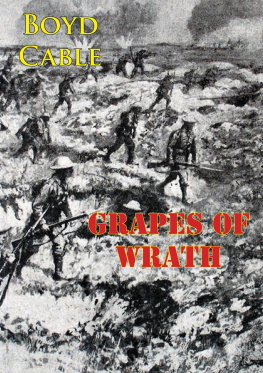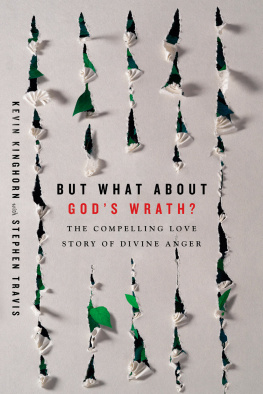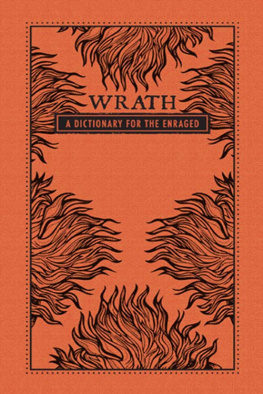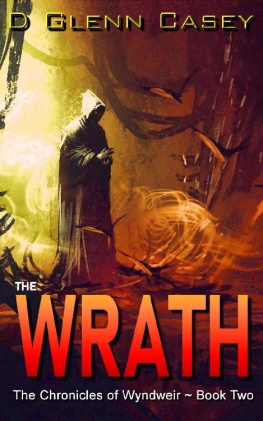T&T Clark Studies in Systematic Theology
Edited by
John Webster, Kings College,
University of Aberdeen, UK
Ian A. McFarland, Candler School of Theology,
Emory University, USA
Ivor Davidson, St Marys College,
University of St Andrews, UK

WRATH AMONG THE PERFECTIONS OF GODS LIFE
by
Jeremy J. Wynne

Published by T&T Clark
A Continuum imprint
The Tower Building, 11 York Road, London SE1 7NX
80 Maiden Lane, Suite 704, New York NY 10038
www.continuumbooks.com
All rights reserved. No part of this publication may be reproduced or transmitted in any form or by any means, electronic or mechanical, including photocopying, recording or any information storage or retrieval system, without permission in writing from the publishers.
Jeremy J. Wynne, 2010
First published 2010
Paperback edition first published 2012
Jeremy J. Wynne has asserted his right under the Copyright, Designs and Patents Act, 1988, to be identified as the Author of this work.
British Library Cataloguing-in-Publication Data
A catalogue record for this book is available from the British Library
eISBN-13: 978-0-5674-2319-1
Typeset by Newgen Imaging Systems Pvt Ltd, Chennai, India Printed and bound in Great Britain
CONTENTS
ACKNOWLEDGMENTS
I have become convinced in the last few years that a responsible account of the triune God ranks among the most edifying (and patently unavoidable) of theological tasks. Like all theological reflection, it requires constant attentiveness to demands for confidence and modesty, breadth and depth, accountability to the authority of tradition, and the call to a genuinely contemporary restatement of Christian faith. It also provides, however, a rare and eminently focused space for reflecting on the glory of the Living One at the center of Holy Scripture and Christian tradition. This book, aimed at clarifying the wrath which belongs to God, is one contribution to this very old task.
The text was developed on the basis of my research studies at the University of Aberdeen culminating in 2009. Thanks are due first to John Webster. For his penetrating feedback, for his rare ability to nurture independence of mind and, of course, for his constant patience and encouragement, I am immensely grateful. Francesca Murphy and Philip Ziegler are master teachers. I am all the richer for the stimulating conversation, good humor, and wise counsel they have provided, as well as three enjoyable years teaching with them on the Critics and Defenders course. Katherine Sonderegger and Donald Wood examined the manuscript with tremendous care, identifying important opportunities for improving the text as well as fresh avenues for future research. Friends and officemates, finally, have made Kings College a home away from home; I think especially of Andy Draycott, Darren Sarisky, David Gibson, David Gilland, Carolyn Kelly and, in the final hour, Justin Stratis.
Without the financial support of the Overseas Research Studentship Award Scheme and the University of Aberdeen College of Arts and Social Sciences, this research would not have been possible. The college is well attuned to both the needs of its students and the demands of the job and has been particularly generous in providing stipends to help with research in Princeton and Chicago as well as office space for the duration of the program.
I am grateful for the pastors and pilgrims of High Church Hilton, who embraced our family and ministered to us daily. The events leading us to Scotland were set in motion years ago. It was from my loving parents, Jim and Karen, that I first heard the words of the Gospel, and their support for this move overseas never wavered. In our final two years in Aberdeen, both Hannah Verity and Asher James were born. They have been for me as clear a miracle of Gods grace as I have ever known and a wonderful distraction from research. I hope they can return one day to visit the place of their birth. My deepest love and gratitude, however, is reserved for Betsy, my wife and co-worker in the faith. This book is dedicated to her.
J. Wynne
Advent 2009
1
A SYSTEMATIC APPROACH RECONSIDERED
From a survey of theological science in its many subdisciplines, it would seem that the matter of divine wrath is among the more elusive of scriptural themes. There is a substantial body of literature available on the topic, which spans the continuums of terse and expansive, wary and enthusiastic, impressionistic and analytic, ancient and contemporary. Despite the fact that the wrath of God has been a topic for these sundry occasional and thematic studies, the crucial question of its place within a more nearly systematic account of Christian theologywhich is to say, an account of wrath selfconsciously worked out in light of the wholehas largely been neglected.
More common is the strategy of analyzing a handful of persistent and thorny questions, not the least of which explore whether wrath is an affective dimension of Gods character or an effect of Gods working; whether it is more directly attributable to divine action ab extra or an outworking of structures immanent to creation; or, finally, whether there is assignable to wrath any properly redemptive, or perhaps pedagogical, end. Inevitable as it is that such matters are touched upon in any extended essay on Gods oppositional work, nonetheless, this general approach to the question fosters more confusion than clarity. Principally, it overlooks the complex manner in which the scriptures of the Old and New Testaments guide theological judgments concerning the character of the triune God. The purpose of this study, therefore, is to work out with greater systematic specificity the Christian claim that wrath belongs to God in his perfection.
The present chapter unfolds in three parts. To begin with, a modest overview of the kinds of studies which are already availableliterary, historical, practical, and systematicwill suggest the importance of a constructive account of the fitting coordination between form and content in theological consideration of divine identity descriptions. Second, we will suggest by way of transition that a renewal of interest surrounds the specifically theological task of the divine perfections, and so we will indicate at least one major resource for this investigation as well as a few key contemporary representatives. Development of these two observationsa representative overview of scholarly work on Gods wrath as well as one provocative and innovative approach to this doctrinal locusprovides the background for the distinctiveness of this study. We will conclude by outlining, third, the goals and limitations that attend this constructive, biblical-dogmatic essay on wraths place among the perfections of Gods life.
I. Theological Approaches to the Topic of Wrath
One useful place to begin is with a representative overview of scholarly work on Gods wrath. The subject has been variously treated as a biblical and literary theme, such that matters of terminological frequency, genre, intertextuality, and sociocultural context are pressed to render the most reliable semantic range for translation and interpretation. In the specific case of Gods wrath, these kinds of studies have been executed with both painstaking attention to individual passages and an impressive grasp of the broad canon of testimony. As will be made particularly clear in the scriptural exposition of
Next page












